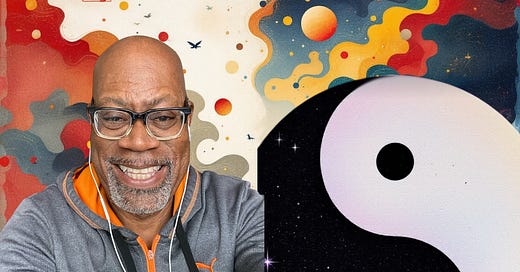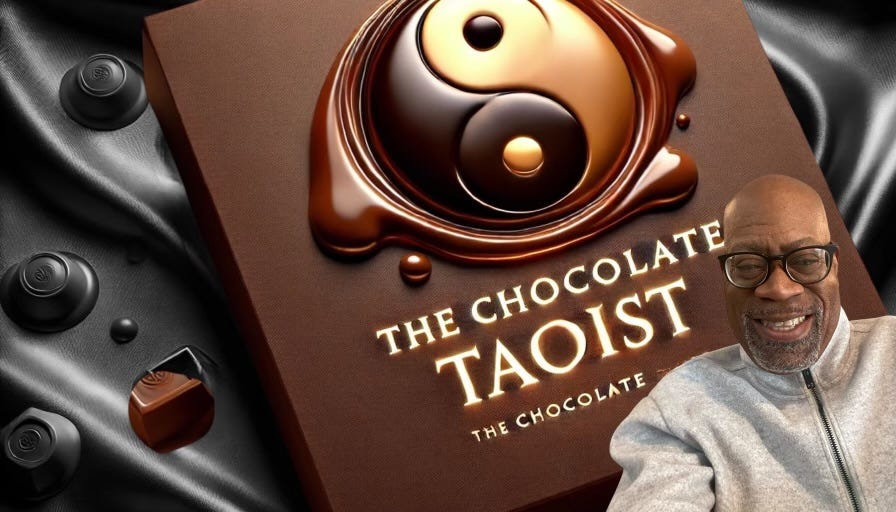Taoism and Confucianism walked into my brain one day, and I’ve been trying to referee their philosophical brawl ever since.
It’s not so much a war as it is a weird family reunion — Taoism is the cool, eccentric uncle who tells you to let go and float down the river, while Confucianism is the strict but well-meaning aunt insisting you sit up straight and call your grandma.
Caught between their vastly different approaches to life, I’ve spent years teetering on the line between spontaneity and structure, simplicity and propriety, cosmic flow and… work obligations.
It all started innocently enough. As someone enamored with the flow of Taoism—the effortless way it invites you to align with nature and stop stressing about the latest political dumpster fire—I thought I had found my spiritual soulmate.
Lao Tzu’s Tao Te Ching was like a warm, calming bath for my overworked brain. But then Confucius, bless his earnest heart, barged in with his Analects and made me wonder if I was shirking my social duties by focusing too much on flow and not enough on filial piety. “Do you even respect your ancestors?” he seemed to whisper.
That’s the thing about Confucianism. It doesn’t just ask you to think about living a virtuous life—it pulls out a clipboard and a checklist.
Ren (benevolence)? Check.
Yi (righteousness)? Double check.
Li (proper behavior)?
Oh boy, where do I even start? The rituals! The deference! The rectification of names!
Meanwhile, Taoism is in the corner, sipping tea and saying, “Names? Labels? Nah, just be.”
What fascinates me most is how these philosophies coexist in Chinese culture despite being so different.
Confucianism feels like the HR manual of life—filled with rules, decorum, and a sense of responsibility toward society.
Taoism, on the other hand, is the employee who glides through the office barefoot, handing out organic tea and encouraging everyone to “just breathe.”
Somehow, they’ve found a way to complement each other. Many Chinese folks use Confucianism for their professional and social lives while turning to Taoism for inner peace. It’s the philosophical equivalent of meal prepping while wearing yoga pants.
Of course, Buddhism occasionally sneaks in like a middle sibling, asking, “Have you considered enlightenment?” But that’s a story for another day.
Where Taoism and Confucianism really differ is in their approach to governance and relationships. Confucius insists that good leadership comes from setting a moral example. In other words, leaders should be virtuous and guide their people with wisdom and kindness.
This resonated with me… until I remember my last boss, who tried to lead our executive team with “motivational speeches” instead of pay raises.
Cue Taoism’s advice: Let things happen naturally. Instead of micromanaging, maybe we should all take a collective nap and see what arises from the silence.
And don’t get me started on their contrasting views of relationships. Confucius loves a good hierarchy—the Five Relationships outline exactly how everyone should behave toward everyone else.
You’re a child? Respect your parents.
A ruler? Be virtuous.
A spouse? Stay in your lane.
Taoism, on the other hand, treats relationships like water: no strict roles, just ebb and flow. As someone who once tried (and failed) to follow relationship “rules” to win over a narcissistic ex, I’ve since adopted Taoism’s advice: Stop forcing things and let the universe decide. (The universe, by the way, decided I should be single for a while. Fair enough.)
Still, I can’t shake the feeling that both philosophies are nudging me toward something important. Taoism reminds me to slow down, trust the process, and embrace spontaneity.
Confucianism urges me to improve myself, honor tradition, and show up for others. Together, they form a yin-yang of wisdom: one pointing inward, the other outward. Sometimes they clash, but more often than not, they remind me that life isn’t about choosing one philosophy over another—it’s about finding balance.
A number of years ago, I had a breakthrough during a particularly frustrating DMV visit (because where else would philosophy reveal itself?). After an hour of waiting in line, my Confucian side wanted to lecture the clerks about efficiency and public service.
My Taoist side, however, told me to sit quietly and observe the absurd beauty of the moment — the irritated customers, the flickering fluorescent lights, the fact that we were all just trying to renew our registrations in the grand dance of bureaucracy. I left with my id card renewed and my sense of humor intact.
So, how do Taoism and Confucianism compare and contrast? Honestly, I’m still figuring it out. Some days I’m a Confucian go-getter, striving for self-cultivation and ethical behavior. Other days I’m a Taoist drifter, letting go and trusting that life will unfold as it should.
And maybe that’s the point. Life isn’t meant to be boxed into one philosophy or the other—it’s a mix of rules and flow, duty and freedom, yin and yang. Now, if you’ll excuse me, I’m off to sit in nature and think about all the ways I can improve myself… or not.
Join us in the New Year as a paid member supporter. Or feel free to tip me some coffeehouse love here if you feel so inclined.
Your contributions will be much appreciated!
Every bit counts as I strive to deliver high quality feature articles into your inbox on a daily basis. Never any paywalls, just my raw thoughts which are open to everyone on what it means to be human.
Much Love,
Diamond Michael Scott — aka The Chocolate Taoist







Every morning I arise, and stretch, and turn my head to right and left, then fold my bedsheets, while I take delight in knowing that I did not have to do so, but I did. And if I have performed this rite-ly to begin my daily journey, am I following the Way of Kung? or Lao? or both? Or neither?
What a wonderful explanation! I tried to write off Confucianism, but it exists for a reason. I need structure in my life. I also need to just watch and flow. Works for me.